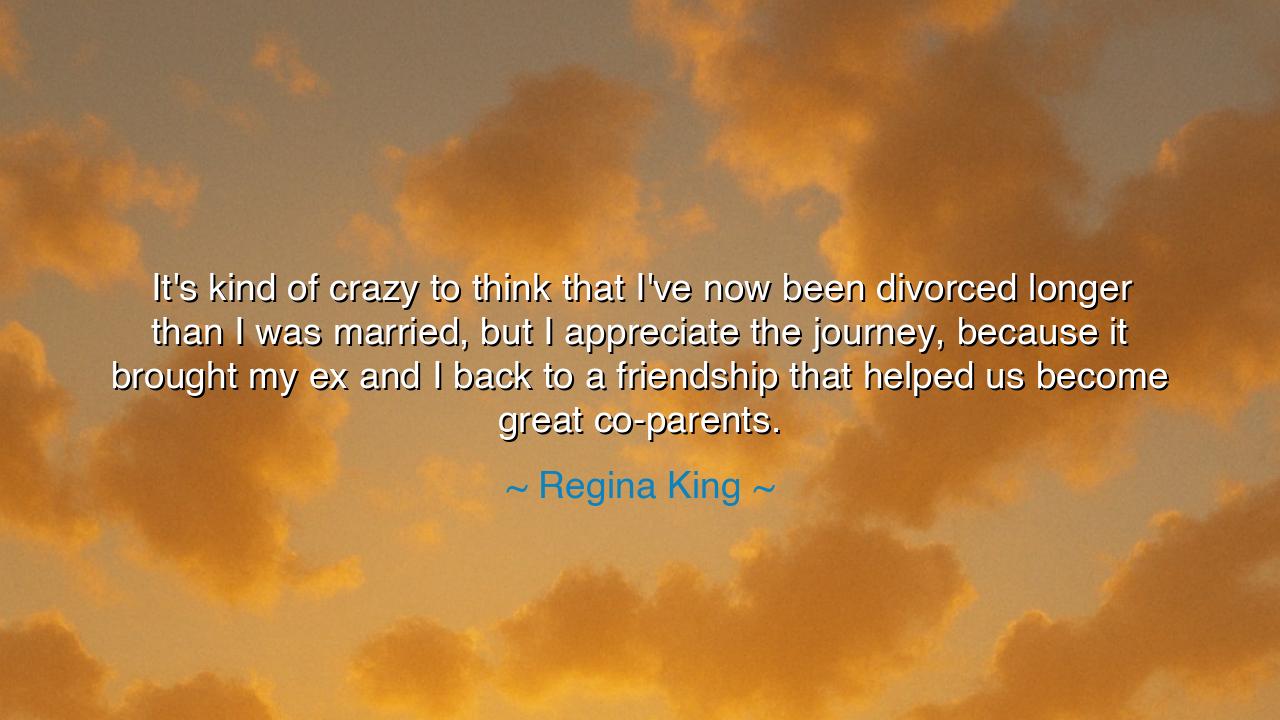
It's kind of crazy to think that I've now been divorced longer
It's kind of crazy to think that I've now been divorced longer than I was married, but I appreciate the journey, because it brought my ex and I back to a friendship that helped us become great co-parents.






The acclaimed actress and director Regina King, a woman whose artistry is matched only by her emotional depth, once reflected: “It's kind of crazy to think that I've now been divorced longer than I was married, but I appreciate the journey, because it brought my ex and I back to a friendship that helped us become great co-parents.” These words, spoken with humility and grace, reveal a truth both timeless and hard-earned—that love may change its form, but it need not lose its meaning. Through this reflection, King teaches us that endings are not always tragedies; they can be transformations, and from the ashes of what was, friendship and healing can rise anew.
The meaning of her words reaches beyond the story of one woman’s marriage—it touches the universal rhythm of human connection. King speaks not of regret, but of acceptance and gratitude. She acknowledges the strange symmetry of time—that she has lived longer in the aftermath of a bond than within it—and yet she finds no bitterness there. Instead, she honors the journey itself, recognizing that love’s purpose was not defeated by divorce, only reshaped. In its new form, it became something selfless and enduring: a partnership devoted to their child, a friendship that transcends pain. Her reflection shows us that maturity is not in holding onto what has changed, but in seeing how even brokenness can serve a higher good.
The origin of this wisdom lies in the ancient understanding of cycles—of creation, dissolution, and renewal. In every culture, there are stories of love that transforms rather than dies. The Greeks spoke of Eros, the passion that burns brightly, and Philia, the friendship that remains after the flame has softened. King’s story mirrors this evolution of love. What began as romantic fire matured into something gentler but no less sacred: the steadfast warmth of mutual respect. Her insight reminds us that growth often demands loss, and that peace is found not in clinging to what once was, but in honoring what remains.
History offers us many examples of such grace. Consider Abigail and John Adams, one of the most devoted couples in American history. Their letters reveal not only love but friendship—the kind that endured war, distance, and even disagreement. And though their marriage never dissolved, their partnership evolved through countless trials, proving that true love’s highest form is not passion but companionship. In a modern reflection of this ideal, Regina King shows that even when marriage ends, the friendship it leaves behind can still be a vessel for love, understanding, and shared purpose.
King’s acknowledgment of her journey also holds a quiet heroism. It takes courage to speak of divorce not as failure but as transformation. Too often, society treats the end of a marriage as shame, yet King reframes it as wisdom. Her words remind us that healing begins when we allow the past to serve its purpose—to teach, to soften, and to guide us toward something higher. By returning to friendship with her former partner, she demonstrates that forgiveness is not weakness but strength—the strength to rise above resentment, to choose cooperation over conflict, and to build a foundation of love for the sake of one’s child.
Her reflection also carries a lesson in compassion—that relationships need not be defined solely by their beginnings or endings, but by how they evolve. Love, when freed from possession, becomes a kind of universal kindness. To be great co-parents, as King says, is to act from love even when the shape of that love has changed. It means showing the child that two people can outgrow a marriage yet still honor each other’s humanity. It is an act of moral courage, a triumph not of passion but of character. In this way, King’s journey is not only personal but archetypal: it represents the eternal human effort to turn sorrow into grace.
The lesson we can take from her words is clear and profound: do not measure love only by its endurance, but by what it creates. When a relationship changes, ask not “What have I lost?” but “What remains that is still good?” Practice forgiveness—not as a gift to others, but as freedom for your own heart. Seek friendship where bitterness once lived; build bridges where anger once burned. And when life brings endings, meet them not with despair but with reverence, knowing that even endings can lead to peace.
For as Regina King reminds us, love does not always last in the way we imagine—but when lived with integrity, it never truly ends. It transforms, matures, and often returns as something purer: friendship born from wisdom, loyalty born from love, and peace born from pain. Those who learn this truth walk through life not with scars, but with strength—the kind that can look back upon loss and say, with quiet triumph, I have grown from this, and I am grateful.






AAdministratorAdministrator
Welcome, honored guests. Please leave a comment, we will respond soon